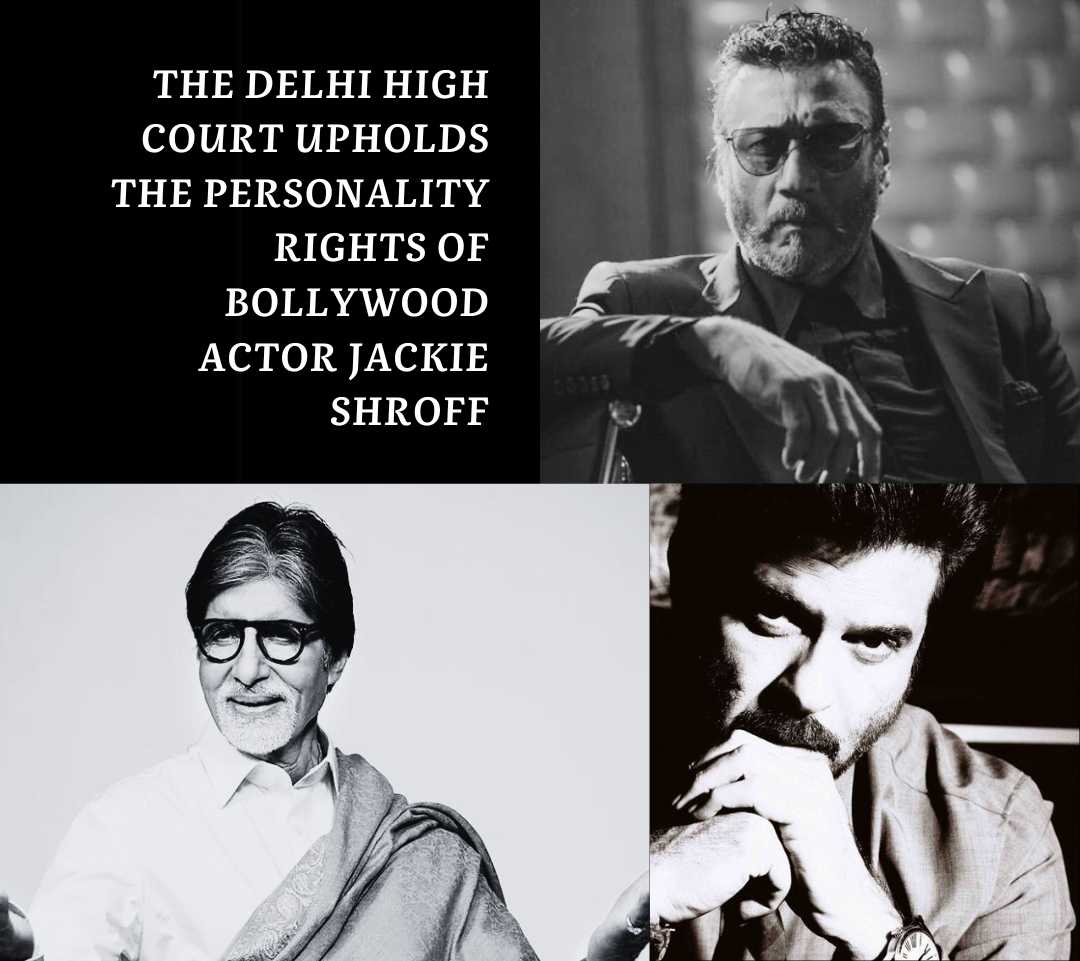By Shreyansh Gupta, 4th June, 2024
This decision of the Delhi High Court highlights the importance of safeguarding the identity of famous celebrities from what is effectively a form of identity theft. The recognition of personality rights, or image rights, as a distinct form of intellectual property has become a global trend. This article explains the concept of personality rights and their intersection with Intellectual Property laws and has been written by Shreyansh Gupta, a final year LL.B student of Faculty of Law, University of Delhi.

Introduction
Recently, the Delhi High Court has upheld the personality rights of Bollywood actor Jackie Shroff, marking a significant moment in Indian law. This is not the first time such a ruling has been made, earlier, iconic celebrities like Amitabh Bachchan and Anil Kapoor also successfully claimed their personality rights.
The way the court has restricted different entities from encroaching upon Shroff’s name, image, and voice among other proprietary rights, it can be argued that there is an increased fatality in respect of defending the commercial interest as well as the intellectual property of the celebrities in the nation.
This decision of the Delhi High Court highlights the importance of safeguarding the identity of famous celebrities from what is effectively a form of identity theft. The recognition of personality rights, or image rights, as a distinct form of intellectual property has become a global trend. Emerging as a distinct form of property, these rights have started to intersect with intellectual property rights, particularly when a person’s ability to exploit their image holds significant economic value. It is the individual’s right to publicize and control the commercial use of their identity, such as their name, image, likeness, character, pattern, and other personal attributes. This, in turn, invoked many famous actors to initiate the cases claiming their personality rights.
Background of the Case
Jackie Shroff, a veteran actor with a career spanning over four decades, also known by his stage name “Jaggu Dada,” is a well-known figure in Indian cinema. His distinctive style and persona have made him a recognizable and influential public figure. Additionally, Shroff’s commercial endorsements and registered trademark for the term “Bhidu” further solidify his status as a celebrity with significant brand equity. The issue leading to the lawsuit arose when a third party used Shroff’s likeness without his permission in a commercial advertisement. The company had used Shroff’s name and photographs leading the actor to seek legal recourse to protect his personality rights.
Shroff argued that this unauthorized use could mislead the public, potentially damaging his reputation and diluting his brand. The unauthorized use of his image suggested an endorsement that never existed, thereby violating his personality rights. These entities were allegedly exploiting Shroff’s persona for commercial gain, creating confusion and potentially damaging his reputation. This misuse of his image without consent became the reason of the legal battle, bringing to the forefront the need for robust legal protections for personality rights in India.
The Delhi High Court in the present case namely JAIKISHAN KAKUBHAI SARAF ALIAS JACKIE SHROFF Versus THE PEPPY STORE & ORS has made following observations:
“The Plaintiff’s commercial endorsements leverage his personality, name, voice, image, likeness, mannerisms, gestures, and other uniquely identifiable characteristics associated with him. These attributes, over which the Plaintiff exercises exclusive control, constitute his ‘personality rights’ and ‘publicity rights.’ The unauthorized use of these characteristics for commercial purposes not only infringes upon these rights but also dilutes the brand equity painstakingly built by the Plaintiff over the years. The Plaintiff, being a person of celebrity status, possesses ‘Personality/Publicity Rights’ over all facets of his persona.”
The case caught significant media attention, with many in the entertainment industry watching closely, as the outcome would potentially affect numerous celebrities who face similar issues. Shroff’s decision to take legal action emphasized the importance of maintaining control over one’s image and reputation, particularly in an age where digital media can rapidly amplify unauthorized content.
Understanding Personality Rights
Personality rights, also known as the right of publicity, refer to an individual’s control over the commercial use of their identity, including their name, image, likeness, and other defining characteristics. These rights ensure that individuals, particularly celebrities, can prevent unauthorized commercial exploitation of their persona. In India, personality rights are not explicitly mentioned in statutory law but are derived from a combination of privacy rights, defamation laws, and intellectual property rights.
The legal framework for personality rights in India has been evolving through judicial pronouncements. Courts have often relied on Article 21 of the Indian Constitution,1 which guarantees the right to life and personal liberty, to extend protection to an individual’s image and reputation. Internationally, countries like the United States have well-established legal frameworks for personality rights, providing comprehensive protection for individuals. The right of publicity in the U.S. allows individuals to control and profit from the commercial use of their persona. European countries also recognize personality rights, though the extent of protection varies.2
The lack of explicit legislation in India makes judicial interpretations crucial for defining the scope and protection of these rights. The Delhi High Court’s orders in the Anil Kapoor and Amitabh Bachchan cases have set important precedents, paving the way for the current case involving Jackie Shroff.3
Legal Arguments
The case instituted by Mr. Jackie Shroff was directed against a total of 18 defendants, encompassing a diverse range of entities such as restaurants, gift manufacturing companies, and prominent social media platforms like Instagram and YouTube channels. Jackie Shroff’s legal team presented a strong case, they claimed that the unauthorized use of his name, image, and likeness by the entertainment company constituted a violation of his personality rights and amounted to a form of misappropriation. The actor sought ad- interim and ex-parte ad-interim injunction to restrain these entities from exploiting his persona for commercial purposes without his consent.
The legal arguments were based on several key points:
- Violation of Privacy and Reputation: Shroff’s team argued that the unauthorized use of his image without consent infringed upon his right to privacy and damaged his reputation. They cited precedents where courts had upheld the right to privacy as a fundamental right under Article 21 of the Indian Constitution.
- Misappropriation and Commercial Gain: The argument focused on the commercial exploitation of Shroff’s persona without his permission. By using his image, the third-party sought to profit from Shroff’s established reputation and goodwill, which constituted misappropriation.
- Precedents and Comparative Jurisprudence: The legal team referred to both Indian and international precedents where courts had protected personality rights. They highlighted cases from the United States and Europe where the right of publicity was recognized and enforced.
The defence, on the other hand, presented arguments based on copyright claims and the principles of artistic expression. They contended that certain uses of Shroff’s persona, such as a YouTube video compiling his interviews, should be considered as a form of creative expression and not necessarily an infringement of his rights.
Judgement
The Delhi High Court ruled in favour of Jackie Shroff, recognizing the importance of protecting personality rights in the digital age. The court restrained several entities, including e-commerce stores, AI chatbots, and social media accounts, from using Shroff’s name, voice, image, and other unique characteristics without his consent. The court’s reasoning was based on the recognition of Shroff’s status as a celebrity and the exclusive control he exercises over his persona, which constitutes his “personality rights” and “publicity rights.” The court acknowledged that the unauthorized use of these attributes for commercial purposes infringes upon the actor’s rights and dilutes the brand equity he has built over the years.
The judgment highlighted the need for clearer statutory provisions to protect personality rights in India. The court called for legislative action to provide explicit protections against unauthorized commercial exploitation of individuals’ personas. This ruling serves as a significant step towards stronger legal protections for celebrities and public figures in India.
Impact on Bollywood and Indian Celebrities
Many celebrities, who often face similar issues, see this as a positive step towards protecting their rights. This order sets a precedent that may deter unauthorized use of celebrities’ images in the future, prompting companies and advertisers to seek proper permissions before using celebrity likenesses. Celebrities like Amitabh Bachchan, Shah Rukh Khan, and Deepika Padukone have publicly supported the decision, emphasizing the importance of maintaining control over their images. The ruling is expected to lead to a more cautious approach by advertisers and media companies, ensuring that permissions are obtained before using celebrity likenesses.
This case is expected to influence future legal actions regarding personality rights, as it sets a strong precedent for celebrities and public figures seeking to protect their identities from unauthorized commercial use. Celebrities and their legal teams are likely to closely monitor the developments in this case and potentially use it as a reference for future legal actions. Additionally, it may prompt changes in media and advertising practices, encouraging companies to seek proper consent and authorization before using an individual’s name, image, or likeness for promotional purposes.
Conclusion
The decision is a reminder to advertisers and media companies about the need to get permission to use a celebrity’s image. It also acknowledges the irony in the absence of an explicit personality right in India and calls upon the Indian legislature to expressly codify such a right. This judgement in favour of the Indian celebrities, acts as a much-needed protection keeping a check that their well-maintained name is not used by someone else for commercial purposes. It hits home for everyone too, with a reminder that recognizing different individual is a good thing.
Real-life examples abound where unauthorized use of celebrity images has led to significant issues. For instance, in 2022 In the case of Amitabh Bachchan v. Rajat Negi and Others, the Delhi High Court issued an ex-parte ad interim order on November 25, 2022, acknowledging and safeguarding the personality rights of the renowned actor Amitabh Bachchan. The court issued a broad order preventing the defendants, including unidentified individuals, from exploiting Mr. Bachchan’s name, likeness, photograph, voice, and other personality traits for commercial purposes.
In conclusion, the recent Delhi High Court decision, in support of Jackie Shroff signifies not a victory for him but a triumph for all Indian stars. It underscores the idea that individuals should have authority over their image and reputation prompting businesses and media organizations to act with care. This judgment establishes a precedent that’s likely to impact legal disputes promoting a more ethical use of personal identities in business ventures.
References
